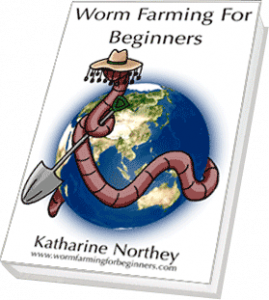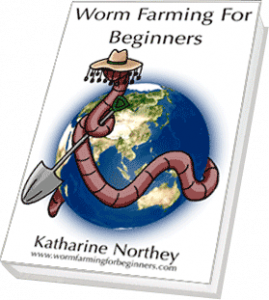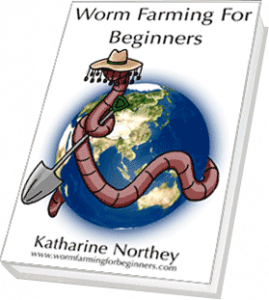What to Feed the Worms
When it comes to feeding, just remember, “anything that was once living can be fed to the worms” (Nancarrow 98).
These include:
– Egg and avocado shells.
– Teabags and coffee filters. (remove the staple)
– Meat in very small amounts. Due to the flesh rotting and causing odours. (I choose not to feed my worms farm meat products)
– Any vegetable and a majority of fruits.
– Carbon – newspapers, cardboard. Be sure to moisten and tear into small strips
(a paper shredder comes in handy for this) prior to adding to your farm. Heavily inked paper is not advised.
– Unprocessed bran. This helps to clear out their systems and help to maintain a healthy worm farm.
– Mushrooms.
– Bananas.
– And, of course, leftovers!
But keep the following out of the worm farm:
– Hair.
– Fresh manures and wastes. These often have active vermicides in them so if you added these to your worm farm you would end up killing your entire population over night. If you are unsure of the age of the manure you would like to use be cautious and wait
– the maximum time (3 months) for the vermicides to dissipate.
– Heavily spiced foods.
– High concentrations of fats, salts, vinegars.
To find out all the foods you should and shouldn’t be feeding the composting worms check out the new book
“Worm Farming for Beginners”.
Have a look at the contents page to discover just what is needed to begin your own Vermiculture endeavour!
Worms•
on January 7th, 2010•
Vermiculture
Vermiculture: the simulated cultivation of composting worms and the scientific process used for extracting their by-products for the betterment of human beings.
Vermiculture: a form of composting utilising worms to fasten up the procedure.
Vermiculture can be the perfect answer for all eco-friendly gardeners out there. Do you want to create a self sufficient environment for yourself and your family?. With vermiculture you can create your own fertilisers, poultry feed, bait for fishing and soil improvers all by composting your own kitchen scraps (plus a few other things like old underwear!)
What is vermi-compost?
– Vermi-compost is the end product from composting with worms.
– Vermi-compost contains castings, broken down organic matter, bedding, worms, worm cocoons, and other organisms.- (Nancarrow 98).
What are castings?
– Castings are worm manure or excrement free from any bedding or food materials.
What is vermi-cast?
– Vermi-cast is what is created when the worms eat and re-eat the pre-existing media (vermi-compost) this produces a finer textured end product. This is the result from leaving the worm farm alone for a lengthy period of time.
Advantages of Vermicomposting.
- Vermicompost is a natural fertiliser made from eco-friendly, bio-degradable everyday “garbage” and is free from chemical inputs.
- Castings are odourless, non toxic, and are suitable to use on all plants, including delicate seedlings.
- Castings do not contain one single trace of E.coli, salmonella or other pathogens as- they are destroyed due to the competition from the active micro flora and intestinal secretions. Most of our human pathogens are anaerobic and cannot survive in the aerobic environment created by worms.
- It provides an immediately available water soluble plant food which is rich in nutrients.

- Castings act as a powerful biocide against disease and nematodes.
- Improvement of soil aeration, texture and water retention capacity of soil because of its high organic matter content.
- Castings strengthen the cell walls increasing the plants resistance to fungal disease, frost, and insect attack.
- Vermiculture encourages better root growth and nutrient absorption.
- The point of terminal wilt is also greater.
To find out all the facts about the benefits of Vermiculture (Worm Farming) check out the new book
“Worm Farming for Beginners”.
Have a look at the contents page to discover just what is needed to begin your own Vermiculture endeavour!
Vermicompost/ vermicomposting.
What is vermi-compost?
– Vermi-compost is the end product from composting with worms.
– Vermi-compost contains castings, broken down organic matter, bedding, worms, worm cocoons, and other organisms.- (Nancarrow 98).
Vermi-compost is a intensely rich & micro bacteria loaded product that earthworms & compost worms excrete when they digest their food .
Vermicomposting utilises composting worms to convert organic wastes into high quality compost. This is one of the way s of composting kitchen scraps into a valued garden media.
Many gardeners use vermicomposting systems for all their garden and kitchen waste, reducing their garbage by up to a third and providing their own organic fertiliser for gardens on verandas and rooftops to grow their own organic produce.
Castings contain:
– A neutral pH of 7 no matter what the diet of the worm.
– (“If you are looking for worms, you are in the right place!” http://members.tripod.com/-wormigrow/)
– Beneficial bacteria, plant growth hormones, vitamins, enzymes, amino acids, selenium, organic carbon.
– 5 times the available nitrogen, 7 times the available potash, and 1 1/2 times the available calcium than found in good top soil. (“Earthworms as a natural resource” Chapman, Ingrid.)
– Humic acid: which is a beneficial fungal activator.
– Fulvic acid: which is a beneficial bacteria activator.
– Auxins: which is an organic substance characterised by its ability to promote growth, particularly in roots. It is an active ingredient in
rooting compounds.
– Not a single trace of E.coli, salmonella or other pathogens as they are destroyed due to the competition from the active micro
flora and intestinal secretions. Most of our human pathogens are anaerobic and cannot survive in the aerobic environment created by worms.
There’s nothing better to put in your garden!
For ALL the information you need to know about vermin-composting simply purchase:
Worm Farming for Beginners.


